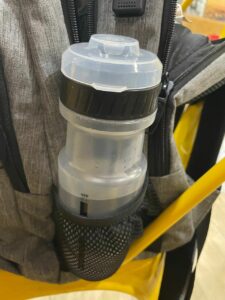Being a nomad myself for a while now, I’ve learned a bunch of sneaky ways to save money without feeling like I’m constantly pinching pennies.
These tips are ideal for anyone who, like me, enjoys the freedom of the nomad life but also appreciates a good deal. So, whether you’re just starting out or a seasoned traveler looking to tighten your budget belt, this guide is here to help you stretch your wanderlust dollars further!
Ways to save money each month as a Digital Nomad
1. Airalo 📞
As a digital nomad, staying connected is crucial. But those international roaming charges from my mobile carrier? Yikes! Thankfully, I use Airalo, a game-changer for affordable data on the go.
Airalo saves me money as a digital nomad by:
Estimated Monthly Savings: $230-$250 💵
The calculation is a bit tricky as data usage varies greatly. Here’s how we can approach it:
- Typical Roaming Charges: International roaming charges can be brutal, often exceeding $10 per day for minimal data usage.
- Airalo eSIM Options: Airalo offers plans ranging from a few gigabytes for a short trip (around $20) to larger plans for extended stays (potentially $50-$70).
Imagine you typically travel for a month. With roaming charges, you could be looking at a hefty bill of $10/day * 30 days = $300! In contrast, an Airalo plan for a month might cost $50-$70, saving you a potential $230-$250.
- Eliminating expensive roaming charges with affordable eSIM data plans.
- Offering flexible data options to fit my specific needs and budget.
- Providing global coverage so I’m never disconnected wherever I travel.
Remember: This is just an example. Your actual savings will depend on your data usage and chosen Airalo plan. It’s always a good idea to check data usage patterns before your trip and choose an Airalo plan that best suits your needs.
Check here if Airalo is available at your destination:
2. Use online international banks 🏦
Traditional banks can be a real headache for digital nomads who frequently move between countries. Thankfully, there are international financial services like Wise that can be a lifesaver. Here’s why Wise is a good fit for the nomadic lifestyle:
- Multi-Currency Management: Hold and convert over 50 currencies all in one place with Wise. No more juggling multiple bank accounts or dealing with currency exchange hassles.
- Transparent Fees: Wise uses the mid-market exchange rate, the same rate you see on Google, and charges clear, low fees for transfers and conversions. This saves you money compared to banks that often mark up exchange rates and hit you with hidden fees.
- Local Account Details: Receive money like a local in up to 10 different currencies with Wise. This eliminates the need for expensive international transfer fees when getting paid by clients abroad.
- Borderless Spending: Get a Wise debit card to spend money in over 40 currencies around the world. Avoid the hassle of carrying cash or getting hit with foreign transaction fees on your regular debit card.
- Zero Transfer Fees (with certain conditions): This is a game-changer for nomads who frequently transfer money internationally. Wise offers free transfers between Wise accounts, allowing you to easily move money between your accounts in different currencies without any hidden fees.
Here is an example of a transfer I made that cost me 0 fees.

Estimated Monthly Savings: The amount saved with Wise depends on your individual circumstances. However, considering the eliminated fees on currency exchange, international transfers, and potentially hefty foreign transaction charges, nomads can see significant monthly savings compared to traditional banks.
For instance, some banks might charge a 3% fee on currency exchange, while Wise uses the mid-market rate. If you’re exchanging a significant amount of money every month, those fees can add up quickly. Wise also eliminates international transfer fees for transfers between Wise accounts, which can be another cost-saving benefit.
3. Buy a bottle 🍶
Forget buying overpriced plastic water bottles!
Invest in a reusable bottle and keep it by your side. Not only will you save a ton of cash (especially in countries with pricey water), but you’ll also be doing your part for the environment. Plus, having your own water on hand keeps you hydrated throughout the day, which is key for staying healthy and avoiding travel woes. Since I started carrying a reusable bottle, I’ve noticed a big difference in my hydration levels and overall well-being. It’s a simple change that makes a big impact!

Estimated Monthly Savings: $90 💵
Here’s a breakdown of the potential monthly savings:
- Average Cost per Bottle: Let’s assume bottled water costs around $1 per bottle (this can vary depending on location and brand).
- Daily Consumption: Consider how much water you typically drink in a day. Maybe it’s 3 bottles?
- Monthly Savings: If you buy 3 bottles daily at $1 each, that’s 3 * $1 = $3 per day. Over a month (around 30 days), that adds up to $3 * 30 = $90 saved!
Important note: This is a rough estimate. You might drink more or less water, and bottled water prices can fluctuate. However, it gives you a good idea of the potential savings.
4. Make sandwiches before a flight 🥪
No matter what flight you take, the food is always overpriced.
Instead of buying food at the airport, make sandwiches before leaving. It will be much cheaper, and you will be able to save a lot of money.
I always make my sandwiches to avoid spending too much money on food. It’s a simple tip, but it can make a big difference
Estimated Monthly Savings (with Assumptions): $20💵
Let’s say you travel twice a month and typically avoid buying overpriced airport food for both trips. If airport meals cost around $10 each time, packing your own sandwiches could save you potentially 2 trips/month x $10/trip = $20 per month.
Remember, this is an estimate based on the assumption of two monthly trips and a $10 average for airport meals. Your actual savings may vary.
5. Book Long-Term Stays for Discounts 🛌
Always try to book your accommodation for at least a month. Many places offer significant discounts (30-50% off!) for longer stays. This benefits them by guaranteeing occupancy, and it benefits you with substantial savings.
Estimated Monthly Savings: $1,200! 💵
Important Note: This is just an example, and actual savings will vary depending on the specific location, rental property, and the discount offered for longer stays.
6. Walk 🚶
Forget taxis!
Walking is your free ticket to city exploration. Stroll charming streets, discover hidden gems, and stay fit – all at zero cost.
Estimated Monthly Savings (with Assumptions): 120$ 💵
Let’s say you typically rely on taxis/Ubers for short trips 3 times a week, with an average cost of $10 per ride. Walking instead could save you 3 rides/week * $10/ride = $30 per week. Over a month (around 4 weeks), that’s a potential saving of $30/week * 4 weeks = $120.
Remember, this is an estimate based on the assumption of 3 weekly taxi rides and a $10 average cost. Your actual savings will vary.
Bonus Tip: Podcasts keep you company and add a learning element to your walks.

7. Use Couchsurfing/Workaway 👥
Couchsurfing: Crash comfortably on a local’s couch (or spare room) for free. Immerse yourself in the local culture, get insider tips, and potentially make lifelong friends – all at zero cost!
Workaway: Trade a few hours of work for accommodation and sometimes meals. This allows you to explore new places while gaining valuable skills and experiences, often in unique settings like eco-farms or hostels. Plus, your accommodation and sometimes food are covered!
Estimated Monthly Savings: 1,500/1,200$ 💵
- Couchsurfing: Since Couchsurfing offers free stays, your monthly savings on accommodation could be significant. Imagine a month with 30 nights typically costing $50 per night in hotels. Couchsurfing could potentially save you 30 nights * $50/night = $1500!
- Workaway: Workaway offers free or heavily discounted accommodation and meals in exchange for volunteer work. The exact savings depend on the program duration and what’s included. Let’s say a Workaway program provides free accommodation and meals for a week (worth $300) in exchange for 20 hours of work. Over a month with 4 weeks of Workaway programs like this, you could potentially save 4 weeks * $300/week = $1200.
Rule the Road with a Digital Nomad Budget 💰
Living the laptop lifestyle means freedom, but that freedom thrives with a solid budget. Here’s how to craft yours:
- Track Your Income: Know your financial runway. Meticulously track income from freelance work, remote jobs, or any other sources to understand your incoming flow.
- Needs vs. Wants: Separate essential expenses (rent, food, internet) from desirable splurges (entertainment, travel upgrades). Prioritize the needs to ensure your basic living costs are covered.
- Destination Deep Dive: Research your planned locations. Accommodation, transportation, and general cost of living can vary greatly. Estimate your monthly spending needs based on these factors.
- Embrace Savings Strategies: This article has been your treasure trove of money-saving hacks! From using Wise for international finance to packing your own plane meals, incorporate these tips to stretch your budget further.
- Track, Analyze, Adapt: Don’t treat your budget like a rigid rulebook. Track your expenses regularly, analyze where your money goes, and adjust your plan as needed. Unexpected costs or changing travel plans require flexibility.
Bonus Tip: Use Budgeting Apps! Consider using budgeting apps or spreadsheets specifically designed for digital nomads. These tools help categorize expenses, track income, and visualize your financial health.
Related: How Much Money Digital Nomads Make
Final thoughts.
So there you have it! These Digital Nomad Money Hacks are all about maximizing your savings without sacrificing the freedom and flexibility of the nomadic lifestyle. Remember, living on the road doesn’t have to mean living paycheck to paycheck. With a little planning and resourcefulness, you can stretch your budget further and experience all the incredible things the world has to offer. Embrace these hacks, explore new destinations, and keep living the dream!

- Improve your digital nomad skills
- Become a Digital Nomad
- To be my friend






